The Role of Leadership in Effecting Organisational Change in SMEs
VerifiedAdded on 2023/01/06
|16
|4977
|89
Report
AI Summary
This report examines the critical role of leadership in driving organisational change and operational excellence within small and medium-sized enterprises (SMEs) in the Eastern Caribbean. It begins by defining leadership and its various styles, such as autocratic, democratic, and coaching, and how these styles influence an organisation's ability to implement change and achieve its goals. The report highlights the rationale and importance of the study, emphasizing the significance of leadership in fostering growth and development within SMEs. It outlines the research aim, objectives, and research questions, focusing on identifying effective leadership approaches, strategies for managing change, and addressing challenges such as employee resistance. A comprehensive literature review explores key concepts, including leadership styles, organisational change, and the challenges faced by leaders during implementation. The research design and plan are then presented, detailing the methods used to gather and analyse data to determine the impact of leadership on organisational performance and effectiveness within the context of SMEs in the Eastern Caribbean.
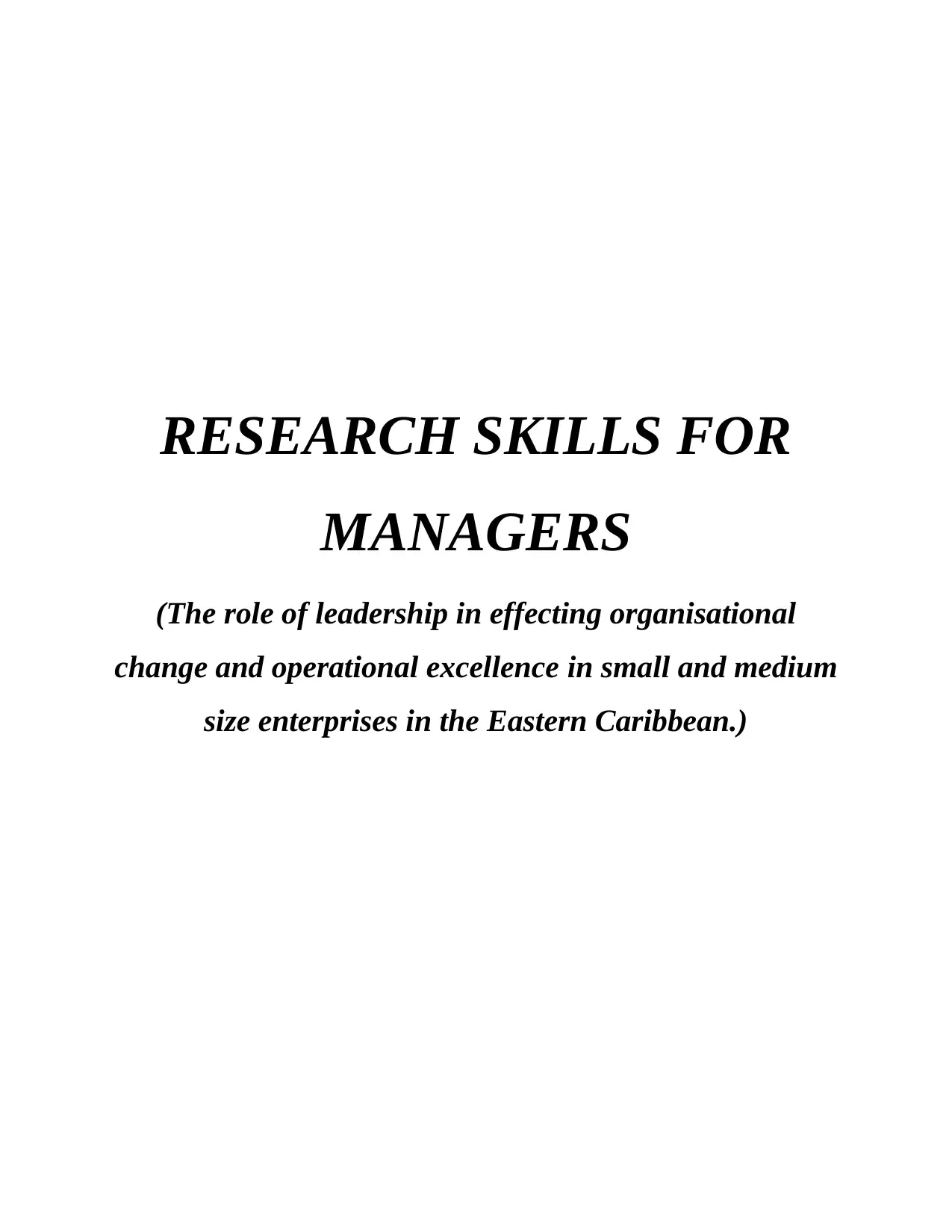
RESEARCH SKILLS FOR
MANAGERS
(The role of leadership in effecting organisational
change and operational excellence in small and medium
size enterprises in the Eastern Caribbean.)
MANAGERS
(The role of leadership in effecting organisational
change and operational excellence in small and medium
size enterprises in the Eastern Caribbean.)
Paraphrase This Document
Need a fresh take? Get an instant paraphrase of this document with our AI Paraphraser
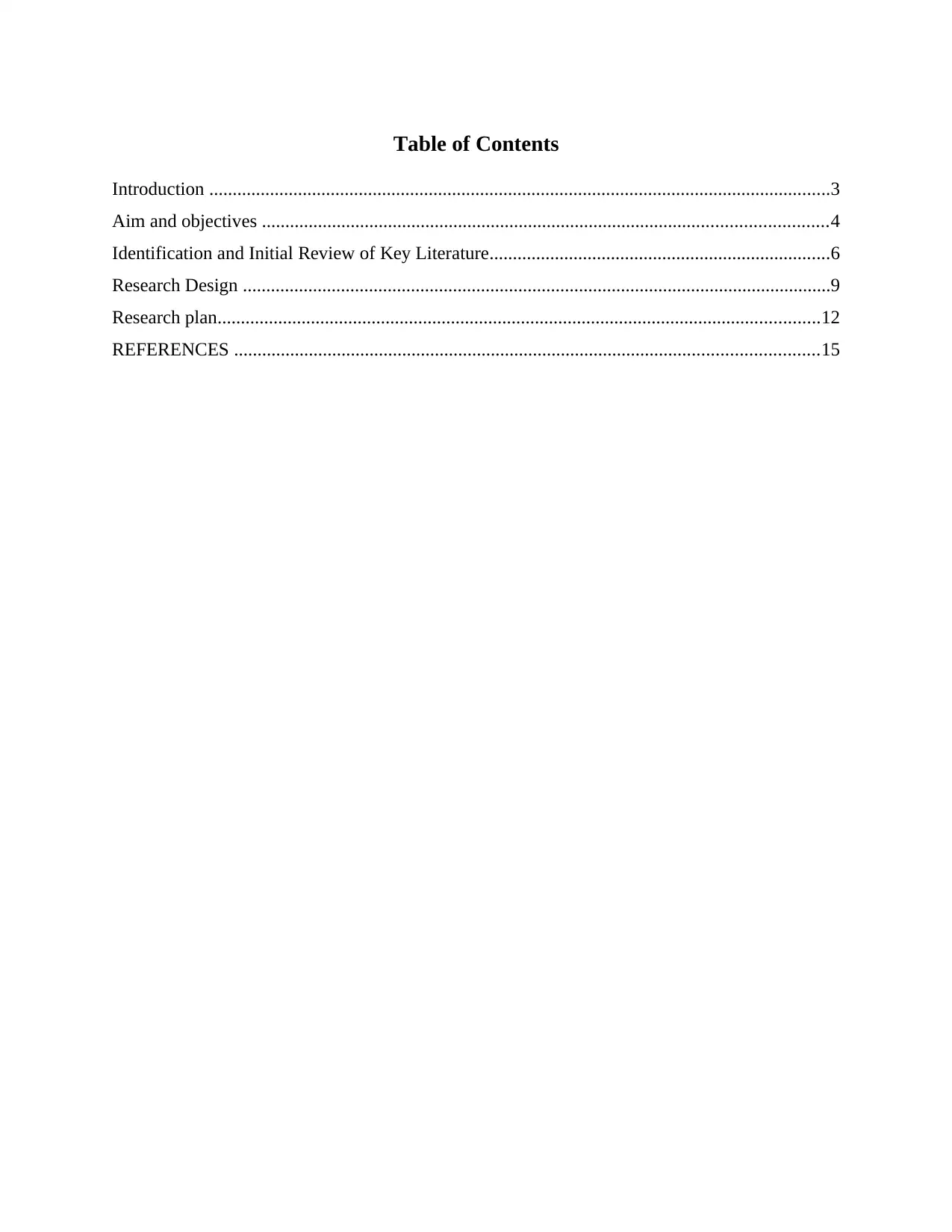
Table of Contents
Introduction .....................................................................................................................................3
Aim and objectives .........................................................................................................................4
Identification and Initial Review of Key Literature.........................................................................6
Research Design ..............................................................................................................................9
Research plan.................................................................................................................................12
REFERENCES .............................................................................................................................15
Introduction .....................................................................................................................................3
Aim and objectives .........................................................................................................................4
Identification and Initial Review of Key Literature.........................................................................6
Research Design ..............................................................................................................................9
Research plan.................................................................................................................................12
REFERENCES .............................................................................................................................15
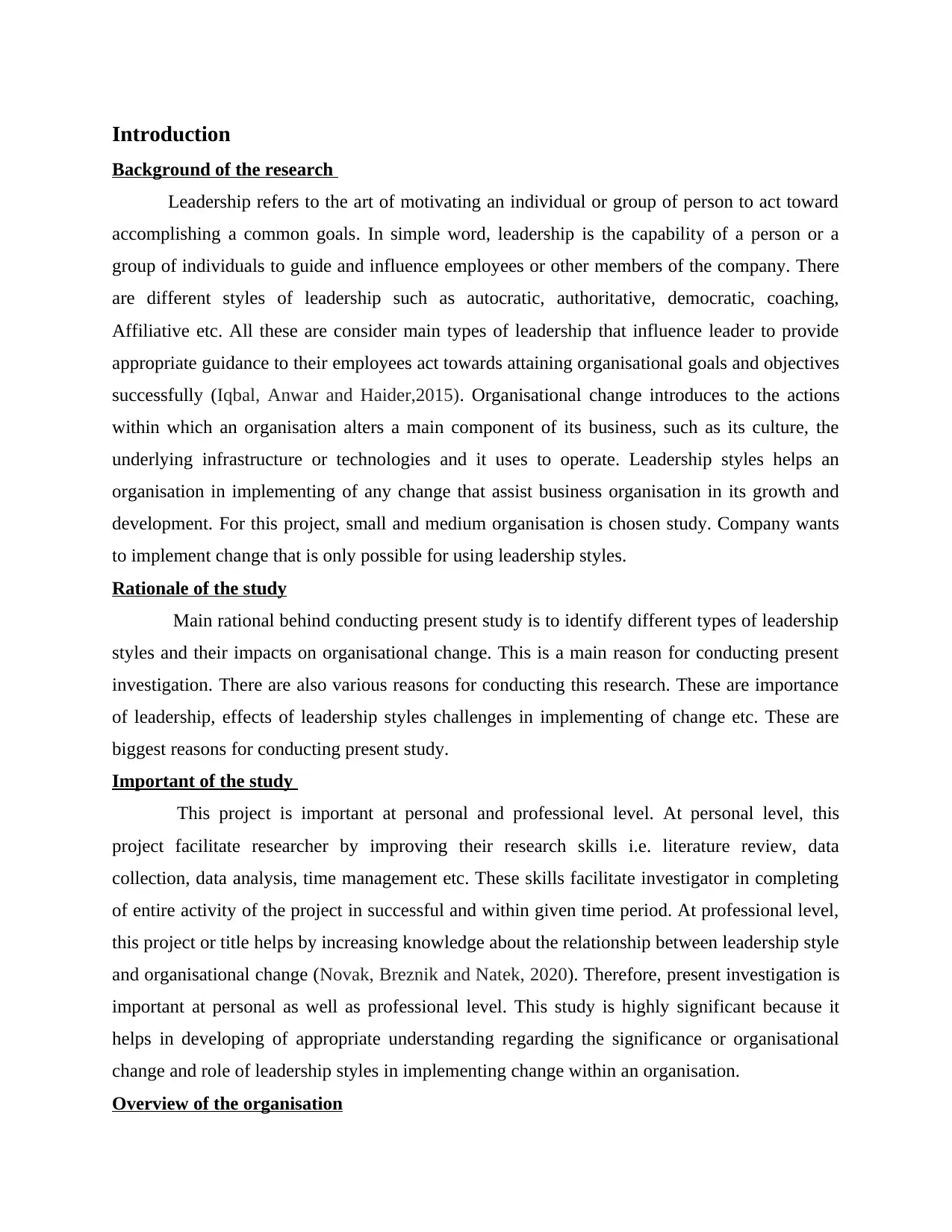
Introduction
Background of the research
Leadership refers to the art of motivating an individual or group of person to act toward
accomplishing a common goals. In simple word, leadership is the capability of a person or a
group of individuals to guide and influence employees or other members of the company. There
are different styles of leadership such as autocratic, authoritative, democratic, coaching,
Affiliative etc. All these are consider main types of leadership that influence leader to provide
appropriate guidance to their employees act towards attaining organisational goals and objectives
successfully (Iqbal, Anwar and Haider,2015). Organisational change introduces to the actions
within which an organisation alters a main component of its business, such as its culture, the
underlying infrastructure or technologies and it uses to operate. Leadership styles helps an
organisation in implementing of any change that assist business organisation in its growth and
development. For this project, small and medium organisation is chosen study. Company wants
to implement change that is only possible for using leadership styles.
Rationale of the study
Main rational behind conducting present study is to identify different types of leadership
styles and their impacts on organisational change. This is a main reason for conducting present
investigation. There are also various reasons for conducting this research. These are importance
of leadership, effects of leadership styles challenges in implementing of change etc. These are
biggest reasons for conducting present study.
Important of the study
This project is important at personal and professional level. At personal level, this
project facilitate researcher by improving their research skills i.e. literature review, data
collection, data analysis, time management etc. These skills facilitate investigator in completing
of entire activity of the project in successful and within given time period. At professional level,
this project or title helps by increasing knowledge about the relationship between leadership style
and organisational change (Novak, Breznik and Natek, 2020). Therefore, present investigation is
important at personal as well as professional level. This study is highly significant because it
helps in developing of appropriate understanding regarding the significance or organisational
change and role of leadership styles in implementing change within an organisation.
Overview of the organisation
Background of the research
Leadership refers to the art of motivating an individual or group of person to act toward
accomplishing a common goals. In simple word, leadership is the capability of a person or a
group of individuals to guide and influence employees or other members of the company. There
are different styles of leadership such as autocratic, authoritative, democratic, coaching,
Affiliative etc. All these are consider main types of leadership that influence leader to provide
appropriate guidance to their employees act towards attaining organisational goals and objectives
successfully (Iqbal, Anwar and Haider,2015). Organisational change introduces to the actions
within which an organisation alters a main component of its business, such as its culture, the
underlying infrastructure or technologies and it uses to operate. Leadership styles helps an
organisation in implementing of any change that assist business organisation in its growth and
development. For this project, small and medium organisation is chosen study. Company wants
to implement change that is only possible for using leadership styles.
Rationale of the study
Main rational behind conducting present study is to identify different types of leadership
styles and their impacts on organisational change. This is a main reason for conducting present
investigation. There are also various reasons for conducting this research. These are importance
of leadership, effects of leadership styles challenges in implementing of change etc. These are
biggest reasons for conducting present study.
Important of the study
This project is important at personal and professional level. At personal level, this
project facilitate researcher by improving their research skills i.e. literature review, data
collection, data analysis, time management etc. These skills facilitate investigator in completing
of entire activity of the project in successful and within given time period. At professional level,
this project or title helps by increasing knowledge about the relationship between leadership style
and organisational change (Novak, Breznik and Natek, 2020). Therefore, present investigation is
important at personal as well as professional level. This study is highly significant because it
helps in developing of appropriate understanding regarding the significance or organisational
change and role of leadership styles in implementing change within an organisation.
Overview of the organisation
⊘ This is a preview!⊘
Do you want full access?
Subscribe today to unlock all pages.

Trusted by 1+ million students worldwide
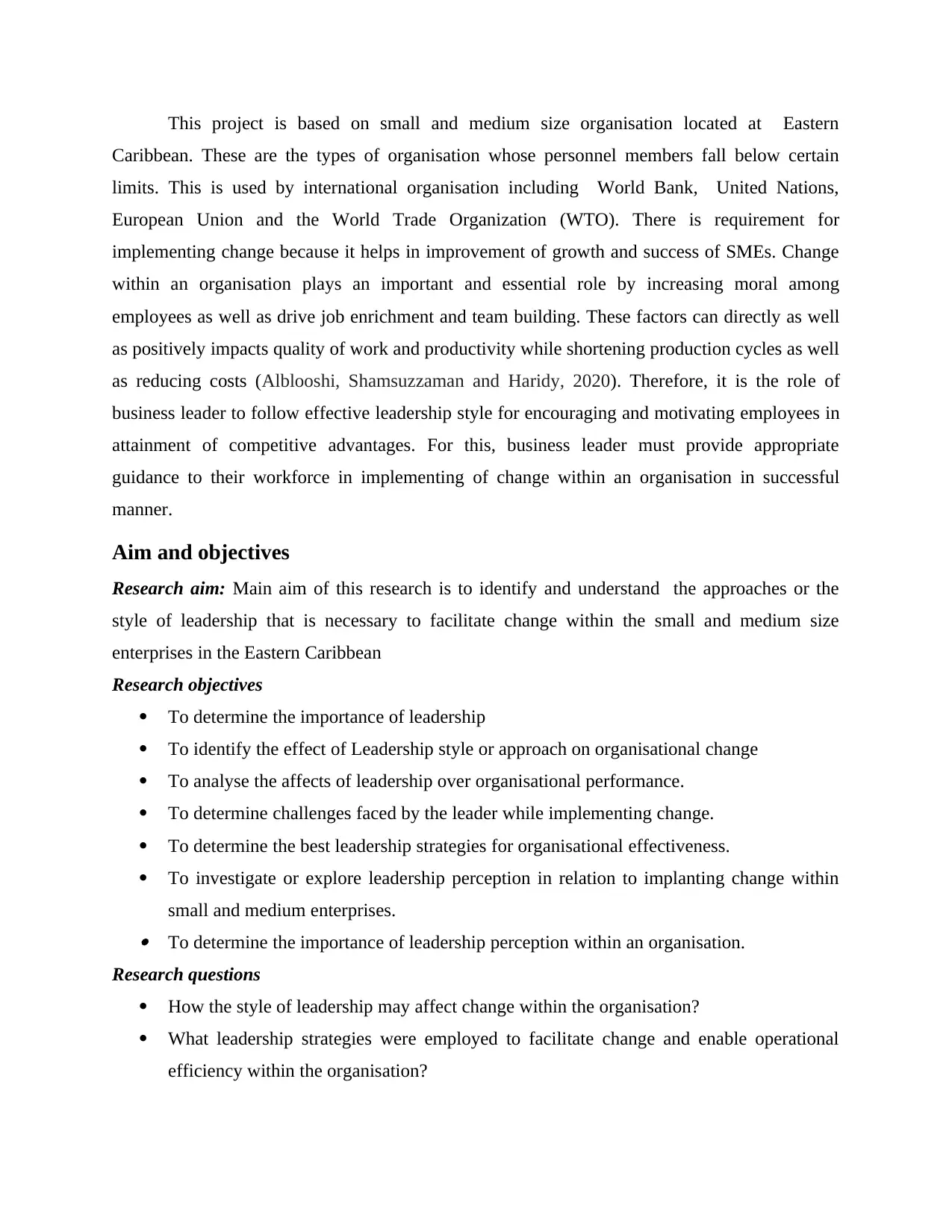
This project is based on small and medium size organisation located at Eastern
Caribbean. These are the types of organisation whose personnel members fall below certain
limits. This is used by international organisation including World Bank, United Nations,
European Union and the World Trade Organization (WTO). There is requirement for
implementing change because it helps in improvement of growth and success of SMEs. Change
within an organisation plays an important and essential role by increasing moral among
employees as well as drive job enrichment and team building. These factors can directly as well
as positively impacts quality of work and productivity while shortening production cycles as well
as reducing costs (Alblooshi, Shamsuzzaman and Haridy, 2020). Therefore, it is the role of
business leader to follow effective leadership style for encouraging and motivating employees in
attainment of competitive advantages. For this, business leader must provide appropriate
guidance to their workforce in implementing of change within an organisation in successful
manner.
Aim and objectives
Research aim: Main aim of this research is to identify and understand the approaches or the
style of leadership that is necessary to facilitate change within the small and medium size
enterprises in the Eastern Caribbean
Research objectives
To determine the importance of leadership
To identify the effect of Leadership style or approach on organisational change
To analyse the affects of leadership over organisational performance.
To determine challenges faced by the leader while implementing change.
To determine the best leadership strategies for organisational effectiveness.
To investigate or explore leadership perception in relation to implanting change within
small and medium enterprises. To determine the importance of leadership perception within an organisation.
Research questions
How the style of leadership may affect change within the organisation?
What leadership strategies were employed to facilitate change and enable operational
efficiency within the organisation?
Caribbean. These are the types of organisation whose personnel members fall below certain
limits. This is used by international organisation including World Bank, United Nations,
European Union and the World Trade Organization (WTO). There is requirement for
implementing change because it helps in improvement of growth and success of SMEs. Change
within an organisation plays an important and essential role by increasing moral among
employees as well as drive job enrichment and team building. These factors can directly as well
as positively impacts quality of work and productivity while shortening production cycles as well
as reducing costs (Alblooshi, Shamsuzzaman and Haridy, 2020). Therefore, it is the role of
business leader to follow effective leadership style for encouraging and motivating employees in
attainment of competitive advantages. For this, business leader must provide appropriate
guidance to their workforce in implementing of change within an organisation in successful
manner.
Aim and objectives
Research aim: Main aim of this research is to identify and understand the approaches or the
style of leadership that is necessary to facilitate change within the small and medium size
enterprises in the Eastern Caribbean
Research objectives
To determine the importance of leadership
To identify the effect of Leadership style or approach on organisational change
To analyse the affects of leadership over organisational performance.
To determine challenges faced by the leader while implementing change.
To determine the best leadership strategies for organisational effectiveness.
To investigate or explore leadership perception in relation to implanting change within
small and medium enterprises. To determine the importance of leadership perception within an organisation.
Research questions
How the style of leadership may affect change within the organisation?
What leadership strategies were employed to facilitate change and enable operational
efficiency within the organisation?
Paraphrase This Document
Need a fresh take? Get an instant paraphrase of this document with our AI Paraphraser
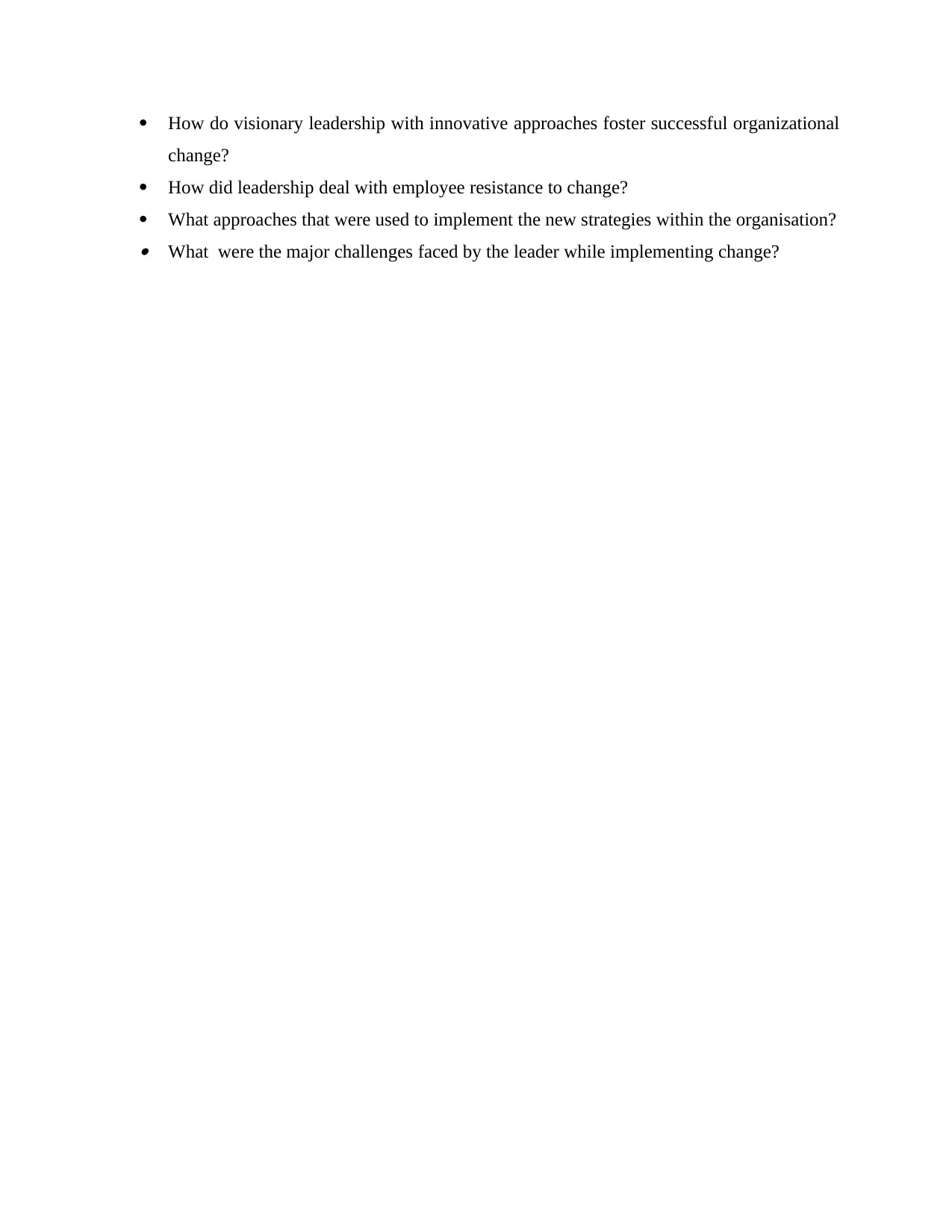
How do visionary leadership with innovative approaches foster successful organizational
change?
How did leadership deal with employee resistance to change?
What approaches that were used to implement the new strategies within the organisation? What were the major challenges faced by the leader while implementing change?
change?
How did leadership deal with employee resistance to change?
What approaches that were used to implement the new strategies within the organisation? What were the major challenges faced by the leader while implementing change?
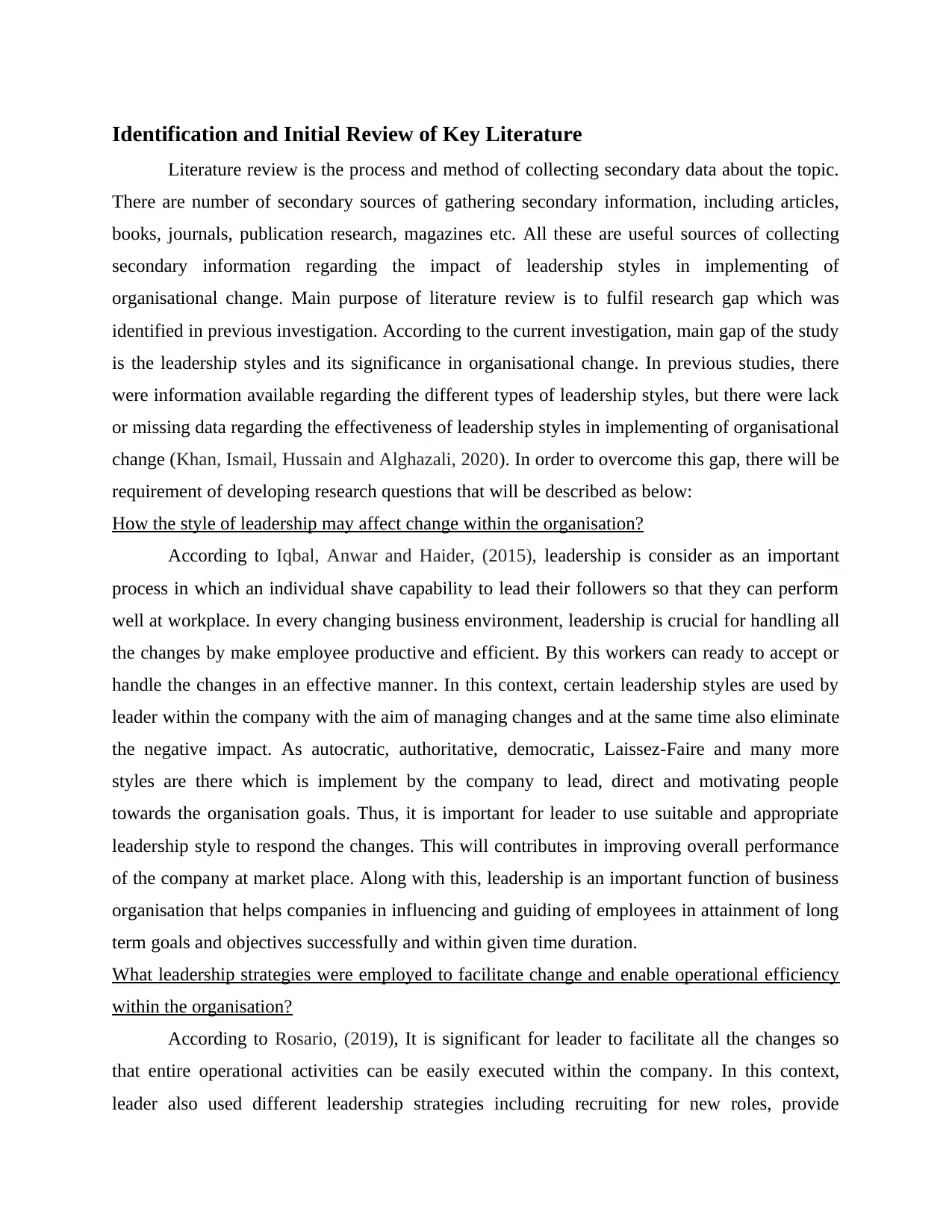
Identification and Initial Review of Key Literature
Literature review is the process and method of collecting secondary data about the topic.
There are number of secondary sources of gathering secondary information, including articles,
books, journals, publication research, magazines etc. All these are useful sources of collecting
secondary information regarding the impact of leadership styles in implementing of
organisational change. Main purpose of literature review is to fulfil research gap which was
identified in previous investigation. According to the current investigation, main gap of the study
is the leadership styles and its significance in organisational change. In previous studies, there
were information available regarding the different types of leadership styles, but there were lack
or missing data regarding the effectiveness of leadership styles in implementing of organisational
change (Khan, Ismail, Hussain and Alghazali, 2020). In order to overcome this gap, there will be
requirement of developing research questions that will be described as below:
How the style of leadership may affect change within the organisation?
According to Iqbal, Anwar and Haider, (2015), leadership is consider as an important
process in which an individual shave capability to lead their followers so that they can perform
well at workplace. In every changing business environment, leadership is crucial for handling all
the changes by make employee productive and efficient. By this workers can ready to accept or
handle the changes in an effective manner. In this context, certain leadership styles are used by
leader within the company with the aim of managing changes and at the same time also eliminate
the negative impact. As autocratic, authoritative, democratic, Laissez-Faire and many more
styles are there which is implement by the company to lead, direct and motivating people
towards the organisation goals. Thus, it is important for leader to use suitable and appropriate
leadership style to respond the changes. This will contributes in improving overall performance
of the company at market place. Along with this, leadership is an important function of business
organisation that helps companies in influencing and guiding of employees in attainment of long
term goals and objectives successfully and within given time duration.
What leadership strategies were employed to facilitate change and enable operational efficiency
within the organisation?
According to Rosario, (2019), It is significant for leader to facilitate all the changes so
that entire operational activities can be easily executed within the company. In this context,
leader also used different leadership strategies including recruiting for new roles, provide
Literature review is the process and method of collecting secondary data about the topic.
There are number of secondary sources of gathering secondary information, including articles,
books, journals, publication research, magazines etc. All these are useful sources of collecting
secondary information regarding the impact of leadership styles in implementing of
organisational change. Main purpose of literature review is to fulfil research gap which was
identified in previous investigation. According to the current investigation, main gap of the study
is the leadership styles and its significance in organisational change. In previous studies, there
were information available regarding the different types of leadership styles, but there were lack
or missing data regarding the effectiveness of leadership styles in implementing of organisational
change (Khan, Ismail, Hussain and Alghazali, 2020). In order to overcome this gap, there will be
requirement of developing research questions that will be described as below:
How the style of leadership may affect change within the organisation?
According to Iqbal, Anwar and Haider, (2015), leadership is consider as an important
process in which an individual shave capability to lead their followers so that they can perform
well at workplace. In every changing business environment, leadership is crucial for handling all
the changes by make employee productive and efficient. By this workers can ready to accept or
handle the changes in an effective manner. In this context, certain leadership styles are used by
leader within the company with the aim of managing changes and at the same time also eliminate
the negative impact. As autocratic, authoritative, democratic, Laissez-Faire and many more
styles are there which is implement by the company to lead, direct and motivating people
towards the organisation goals. Thus, it is important for leader to use suitable and appropriate
leadership style to respond the changes. This will contributes in improving overall performance
of the company at market place. Along with this, leadership is an important function of business
organisation that helps companies in influencing and guiding of employees in attainment of long
term goals and objectives successfully and within given time duration.
What leadership strategies were employed to facilitate change and enable operational efficiency
within the organisation?
According to Rosario, (2019), It is significant for leader to facilitate all the changes so
that entire operational activities can be easily executed within the company. In this context,
leader also used different leadership strategies including recruiting for new roles, provide
⊘ This is a preview!⊘
Do you want full access?
Subscribe today to unlock all pages.

Trusted by 1+ million students worldwide
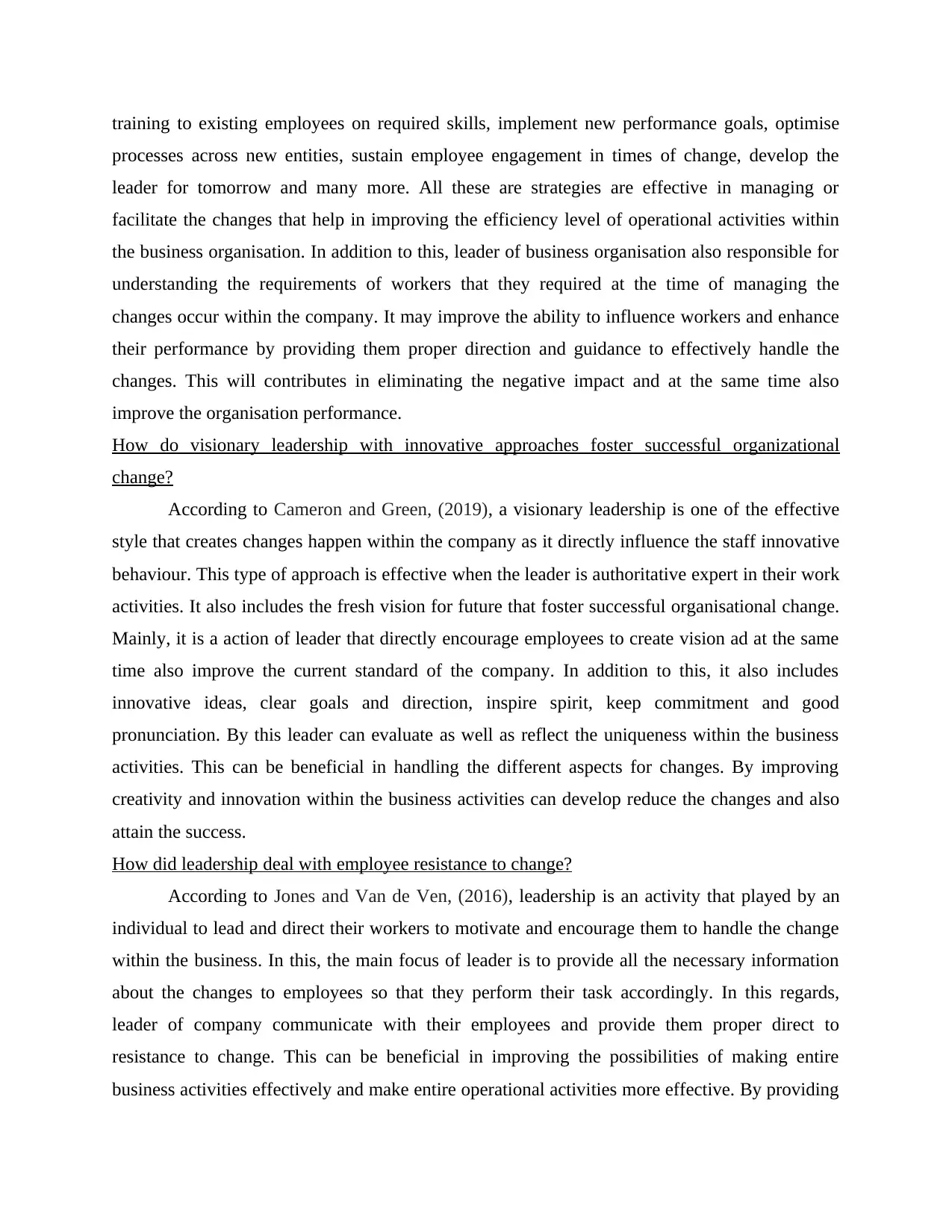
training to existing employees on required skills, implement new performance goals, optimise
processes across new entities, sustain employee engagement in times of change, develop the
leader for tomorrow and many more. All these are strategies are effective in managing or
facilitate the changes that help in improving the efficiency level of operational activities within
the business organisation. In addition to this, leader of business organisation also responsible for
understanding the requirements of workers that they required at the time of managing the
changes occur within the company. It may improve the ability to influence workers and enhance
their performance by providing them proper direction and guidance to effectively handle the
changes. This will contributes in eliminating the negative impact and at the same time also
improve the organisation performance.
How do visionary leadership with innovative approaches foster successful organizational
change?
According to Cameron and Green, (2019), a visionary leadership is one of the effective
style that creates changes happen within the company as it directly influence the staff innovative
behaviour. This type of approach is effective when the leader is authoritative expert in their work
activities. It also includes the fresh vision for future that foster successful organisational change.
Mainly, it is a action of leader that directly encourage employees to create vision ad at the same
time also improve the current standard of the company. In addition to this, it also includes
innovative ideas, clear goals and direction, inspire spirit, keep commitment and good
pronunciation. By this leader can evaluate as well as reflect the uniqueness within the business
activities. This can be beneficial in handling the different aspects for changes. By improving
creativity and innovation within the business activities can develop reduce the changes and also
attain the success.
How did leadership deal with employee resistance to change?
According to Jones and Van de Ven, (2016), leadership is an activity that played by an
individual to lead and direct their workers to motivate and encourage them to handle the change
within the business. In this, the main focus of leader is to provide all the necessary information
about the changes to employees so that they perform their task accordingly. In this regards,
leader of company communicate with their employees and provide them proper direct to
resistance to change. This can be beneficial in improving the possibilities of making entire
business activities effectively and make entire operational activities more effective. By providing
processes across new entities, sustain employee engagement in times of change, develop the
leader for tomorrow and many more. All these are strategies are effective in managing or
facilitate the changes that help in improving the efficiency level of operational activities within
the business organisation. In addition to this, leader of business organisation also responsible for
understanding the requirements of workers that they required at the time of managing the
changes occur within the company. It may improve the ability to influence workers and enhance
their performance by providing them proper direction and guidance to effectively handle the
changes. This will contributes in eliminating the negative impact and at the same time also
improve the organisation performance.
How do visionary leadership with innovative approaches foster successful organizational
change?
According to Cameron and Green, (2019), a visionary leadership is one of the effective
style that creates changes happen within the company as it directly influence the staff innovative
behaviour. This type of approach is effective when the leader is authoritative expert in their work
activities. It also includes the fresh vision for future that foster successful organisational change.
Mainly, it is a action of leader that directly encourage employees to create vision ad at the same
time also improve the current standard of the company. In addition to this, it also includes
innovative ideas, clear goals and direction, inspire spirit, keep commitment and good
pronunciation. By this leader can evaluate as well as reflect the uniqueness within the business
activities. This can be beneficial in handling the different aspects for changes. By improving
creativity and innovation within the business activities can develop reduce the changes and also
attain the success.
How did leadership deal with employee resistance to change?
According to Jones and Van de Ven, (2016), leadership is an activity that played by an
individual to lead and direct their workers to motivate and encourage them to handle the change
within the business. In this, the main focus of leader is to provide all the necessary information
about the changes to employees so that they perform their task accordingly. In this regards,
leader of company communicate with their employees and provide them proper direct to
resistance to change. This can be beneficial in improving the possibilities of making entire
business activities effectively and make entire operational activities more effective. By providing
Paraphrase This Document
Need a fresh take? Get an instant paraphrase of this document with our AI Paraphraser
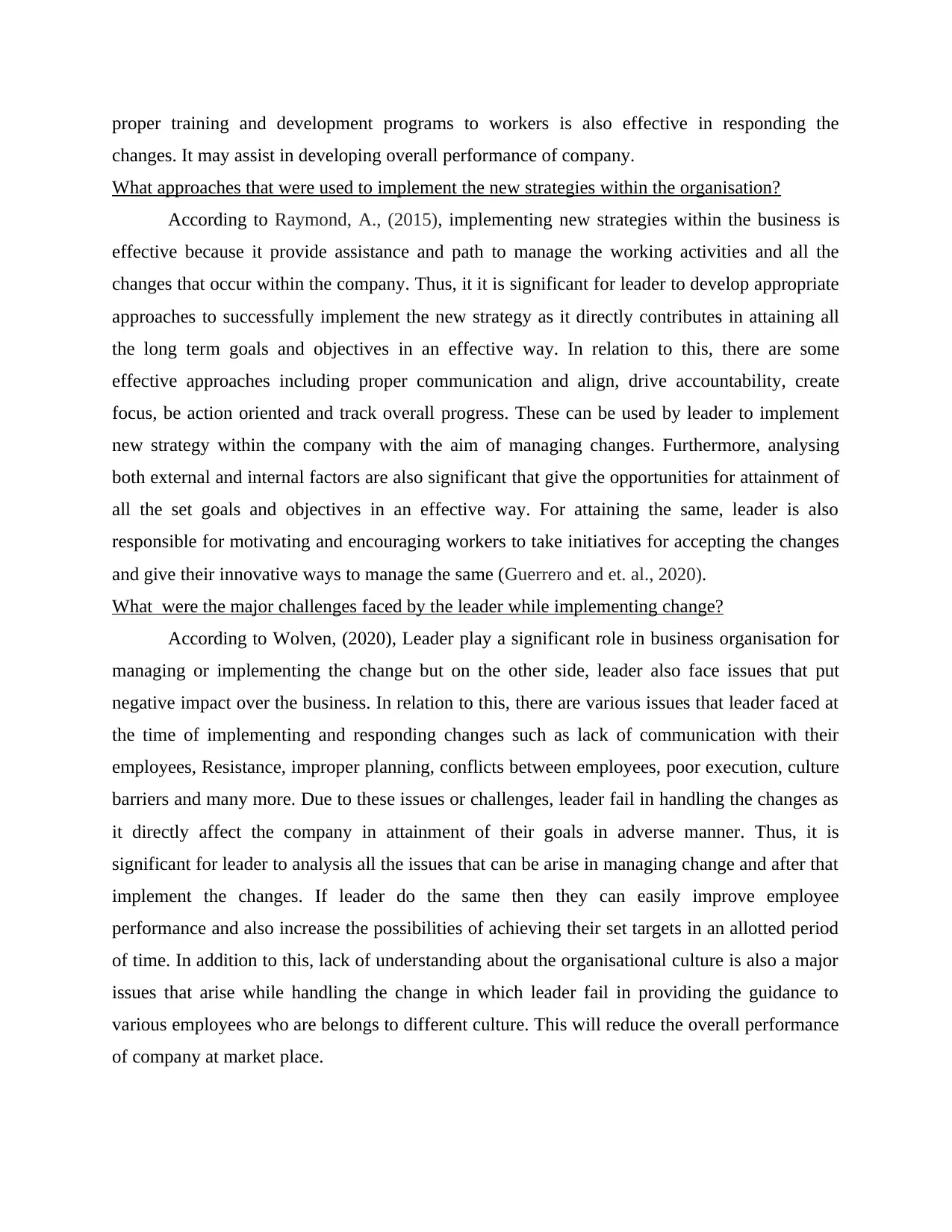
proper training and development programs to workers is also effective in responding the
changes. It may assist in developing overall performance of company.
What approaches that were used to implement the new strategies within the organisation?
According to Raymond, A., (2015), implementing new strategies within the business is
effective because it provide assistance and path to manage the working activities and all the
changes that occur within the company. Thus, it it is significant for leader to develop appropriate
approaches to successfully implement the new strategy as it directly contributes in attaining all
the long term goals and objectives in an effective way. In relation to this, there are some
effective approaches including proper communication and align, drive accountability, create
focus, be action oriented and track overall progress. These can be used by leader to implement
new strategy within the company with the aim of managing changes. Furthermore, analysing
both external and internal factors are also significant that give the opportunities for attainment of
all the set goals and objectives in an effective way. For attaining the same, leader is also
responsible for motivating and encouraging workers to take initiatives for accepting the changes
and give their innovative ways to manage the same (Guerrero and et. al., 2020).
What were the major challenges faced by the leader while implementing change?
According to Wolven, (2020), Leader play a significant role in business organisation for
managing or implementing the change but on the other side, leader also face issues that put
negative impact over the business. In relation to this, there are various issues that leader faced at
the time of implementing and responding changes such as lack of communication with their
employees, Resistance, improper planning, conflicts between employees, poor execution, culture
barriers and many more. Due to these issues or challenges, leader fail in handling the changes as
it directly affect the company in attainment of their goals in adverse manner. Thus, it is
significant for leader to analysis all the issues that can be arise in managing change and after that
implement the changes. If leader do the same then they can easily improve employee
performance and also increase the possibilities of achieving their set targets in an allotted period
of time. In addition to this, lack of understanding about the organisational culture is also a major
issues that arise while handling the change in which leader fail in providing the guidance to
various employees who are belongs to different culture. This will reduce the overall performance
of company at market place.
changes. It may assist in developing overall performance of company.
What approaches that were used to implement the new strategies within the organisation?
According to Raymond, A., (2015), implementing new strategies within the business is
effective because it provide assistance and path to manage the working activities and all the
changes that occur within the company. Thus, it it is significant for leader to develop appropriate
approaches to successfully implement the new strategy as it directly contributes in attaining all
the long term goals and objectives in an effective way. In relation to this, there are some
effective approaches including proper communication and align, drive accountability, create
focus, be action oriented and track overall progress. These can be used by leader to implement
new strategy within the company with the aim of managing changes. Furthermore, analysing
both external and internal factors are also significant that give the opportunities for attainment of
all the set goals and objectives in an effective way. For attaining the same, leader is also
responsible for motivating and encouraging workers to take initiatives for accepting the changes
and give their innovative ways to manage the same (Guerrero and et. al., 2020).
What were the major challenges faced by the leader while implementing change?
According to Wolven, (2020), Leader play a significant role in business organisation for
managing or implementing the change but on the other side, leader also face issues that put
negative impact over the business. In relation to this, there are various issues that leader faced at
the time of implementing and responding changes such as lack of communication with their
employees, Resistance, improper planning, conflicts between employees, poor execution, culture
barriers and many more. Due to these issues or challenges, leader fail in handling the changes as
it directly affect the company in attainment of their goals in adverse manner. Thus, it is
significant for leader to analysis all the issues that can be arise in managing change and after that
implement the changes. If leader do the same then they can easily improve employee
performance and also increase the possibilities of achieving their set targets in an allotted period
of time. In addition to this, lack of understanding about the organisational culture is also a major
issues that arise while handling the change in which leader fail in providing the guidance to
various employees who are belongs to different culture. This will reduce the overall performance
of company at market place.
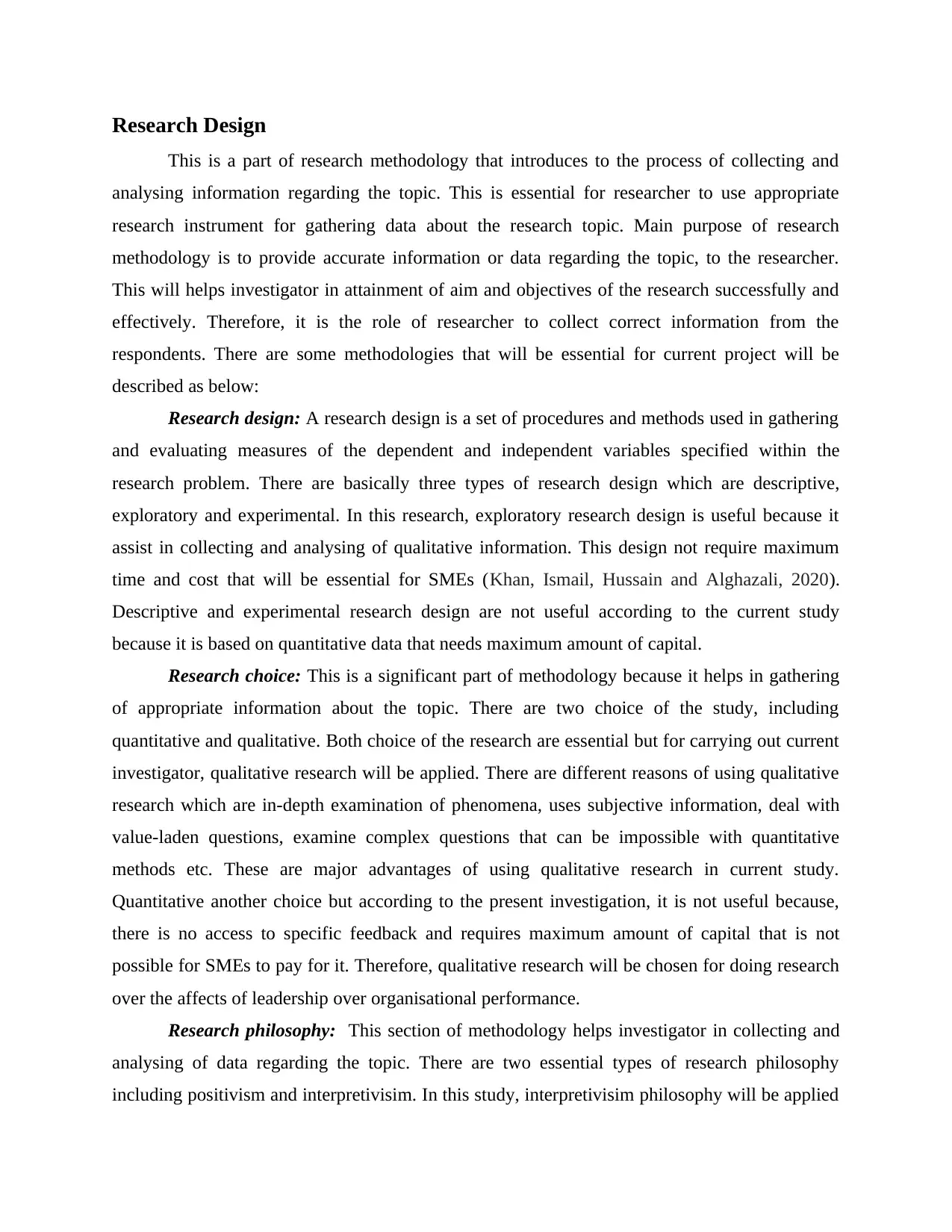
Research Design
This is a part of research methodology that introduces to the process of collecting and
analysing information regarding the topic. This is essential for researcher to use appropriate
research instrument for gathering data about the research topic. Main purpose of research
methodology is to provide accurate information or data regarding the topic, to the researcher.
This will helps investigator in attainment of aim and objectives of the research successfully and
effectively. Therefore, it is the role of researcher to collect correct information from the
respondents. There are some methodologies that will be essential for current project will be
described as below:
Research design: A research design is a set of procedures and methods used in gathering
and evaluating measures of the dependent and independent variables specified within the
research problem. There are basically three types of research design which are descriptive,
exploratory and experimental. In this research, exploratory research design is useful because it
assist in collecting and analysing of qualitative information. This design not require maximum
time and cost that will be essential for SMEs (Khan, Ismail, Hussain and Alghazali, 2020).
Descriptive and experimental research design are not useful according to the current study
because it is based on quantitative data that needs maximum amount of capital.
Research choice: This is a significant part of methodology because it helps in gathering
of appropriate information about the topic. There are two choice of the study, including
quantitative and qualitative. Both choice of the research are essential but for carrying out current
investigator, qualitative research will be applied. There are different reasons of using qualitative
research which are in-depth examination of phenomena, uses subjective information, deal with
value-laden questions, examine complex questions that can be impossible with quantitative
methods etc. These are major advantages of using qualitative research in current study.
Quantitative another choice but according to the present investigation, it is not useful because,
there is no access to specific feedback and requires maximum amount of capital that is not
possible for SMEs to pay for it. Therefore, qualitative research will be chosen for doing research
over the affects of leadership over organisational performance.
Research philosophy: This section of methodology helps investigator in collecting and
analysing of data regarding the topic. There are two essential types of research philosophy
including positivism and interpretivisim. In this study, interpretivisim philosophy will be applied
This is a part of research methodology that introduces to the process of collecting and
analysing information regarding the topic. This is essential for researcher to use appropriate
research instrument for gathering data about the research topic. Main purpose of research
methodology is to provide accurate information or data regarding the topic, to the researcher.
This will helps investigator in attainment of aim and objectives of the research successfully and
effectively. Therefore, it is the role of researcher to collect correct information from the
respondents. There are some methodologies that will be essential for current project will be
described as below:
Research design: A research design is a set of procedures and methods used in gathering
and evaluating measures of the dependent and independent variables specified within the
research problem. There are basically three types of research design which are descriptive,
exploratory and experimental. In this research, exploratory research design is useful because it
assist in collecting and analysing of qualitative information. This design not require maximum
time and cost that will be essential for SMEs (Khan, Ismail, Hussain and Alghazali, 2020).
Descriptive and experimental research design are not useful according to the current study
because it is based on quantitative data that needs maximum amount of capital.
Research choice: This is a significant part of methodology because it helps in gathering
of appropriate information about the topic. There are two choice of the study, including
quantitative and qualitative. Both choice of the research are essential but for carrying out current
investigator, qualitative research will be applied. There are different reasons of using qualitative
research which are in-depth examination of phenomena, uses subjective information, deal with
value-laden questions, examine complex questions that can be impossible with quantitative
methods etc. These are major advantages of using qualitative research in current study.
Quantitative another choice but according to the present investigation, it is not useful because,
there is no access to specific feedback and requires maximum amount of capital that is not
possible for SMEs to pay for it. Therefore, qualitative research will be chosen for doing research
over the affects of leadership over organisational performance.
Research philosophy: This section of methodology helps investigator in collecting and
analysing of data regarding the topic. There are two essential types of research philosophy
including positivism and interpretivisim. In this study, interpretivisim philosophy will be applied
⊘ This is a preview!⊘
Do you want full access?
Subscribe today to unlock all pages.

Trusted by 1+ million students worldwide
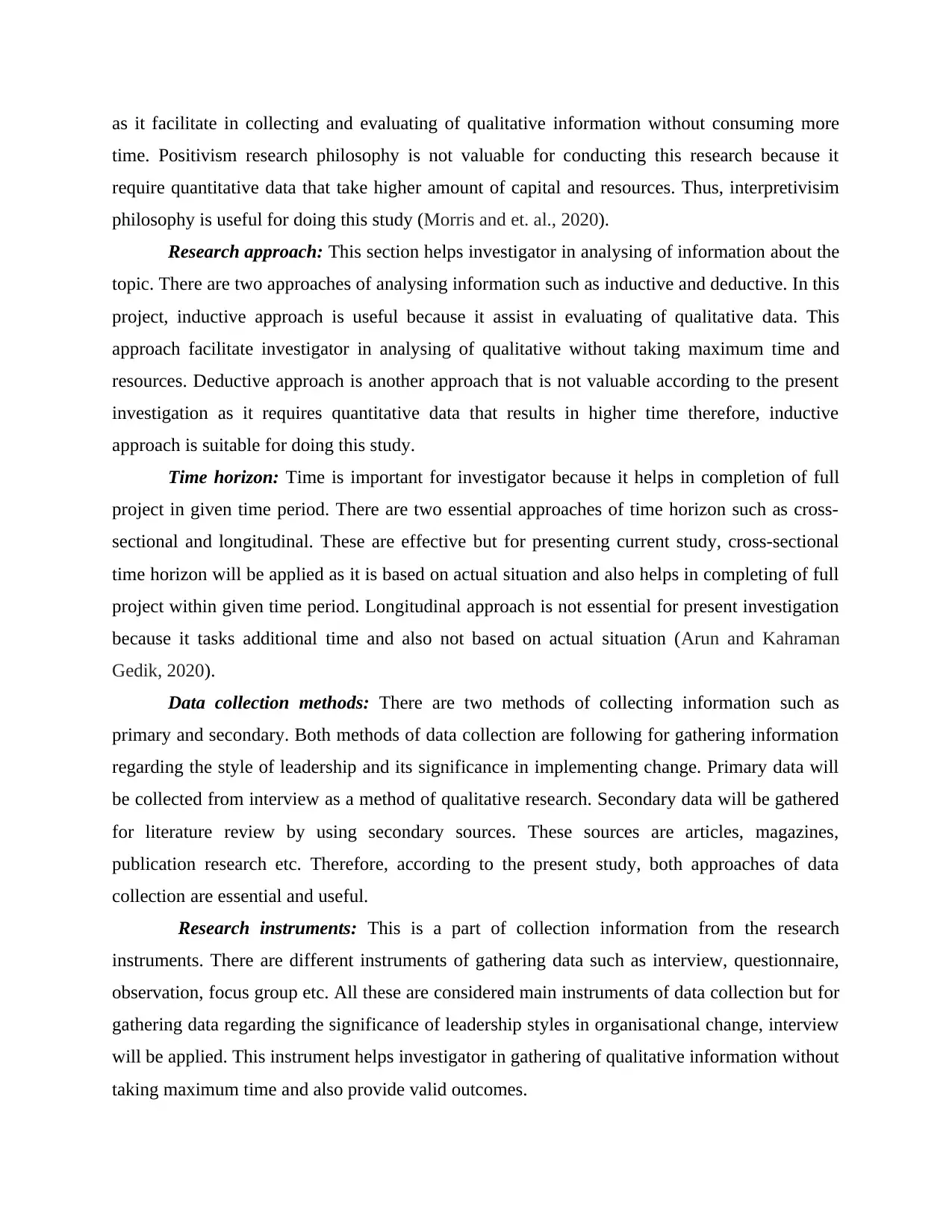
as it facilitate in collecting and evaluating of qualitative information without consuming more
time. Positivism research philosophy is not valuable for conducting this research because it
require quantitative data that take higher amount of capital and resources. Thus, interpretivisim
philosophy is useful for doing this study (Morris and et. al., 2020).
Research approach: This section helps investigator in analysing of information about the
topic. There are two approaches of analysing information such as inductive and deductive. In this
project, inductive approach is useful because it assist in evaluating of qualitative data. This
approach facilitate investigator in analysing of qualitative without taking maximum time and
resources. Deductive approach is another approach that is not valuable according to the present
investigation as it requires quantitative data that results in higher time therefore, inductive
approach is suitable for doing this study.
Time horizon: Time is important for investigator because it helps in completion of full
project in given time period. There are two essential approaches of time horizon such as cross-
sectional and longitudinal. These are effective but for presenting current study, cross-sectional
time horizon will be applied as it is based on actual situation and also helps in completing of full
project within given time period. Longitudinal approach is not essential for present investigation
because it tasks additional time and also not based on actual situation (Arun and Kahraman
Gedik, 2020).
Data collection methods: There are two methods of collecting information such as
primary and secondary. Both methods of data collection are following for gathering information
regarding the style of leadership and its significance in implementing change. Primary data will
be collected from interview as a method of qualitative research. Secondary data will be gathered
for literature review by using secondary sources. These sources are articles, magazines,
publication research etc. Therefore, according to the present study, both approaches of data
collection are essential and useful.
Research instruments: This is a part of collection information from the research
instruments. There are different instruments of gathering data such as interview, questionnaire,
observation, focus group etc. All these are considered main instruments of data collection but for
gathering data regarding the significance of leadership styles in organisational change, interview
will be applied. This instrument helps investigator in gathering of qualitative information without
taking maximum time and also provide valid outcomes.
time. Positivism research philosophy is not valuable for conducting this research because it
require quantitative data that take higher amount of capital and resources. Thus, interpretivisim
philosophy is useful for doing this study (Morris and et. al., 2020).
Research approach: This section helps investigator in analysing of information about the
topic. There are two approaches of analysing information such as inductive and deductive. In this
project, inductive approach is useful because it assist in evaluating of qualitative data. This
approach facilitate investigator in analysing of qualitative without taking maximum time and
resources. Deductive approach is another approach that is not valuable according to the present
investigation as it requires quantitative data that results in higher time therefore, inductive
approach is suitable for doing this study.
Time horizon: Time is important for investigator because it helps in completion of full
project in given time period. There are two essential approaches of time horizon such as cross-
sectional and longitudinal. These are effective but for presenting current study, cross-sectional
time horizon will be applied as it is based on actual situation and also helps in completing of full
project within given time period. Longitudinal approach is not essential for present investigation
because it tasks additional time and also not based on actual situation (Arun and Kahraman
Gedik, 2020).
Data collection methods: There are two methods of collecting information such as
primary and secondary. Both methods of data collection are following for gathering information
regarding the style of leadership and its significance in implementing change. Primary data will
be collected from interview as a method of qualitative research. Secondary data will be gathered
for literature review by using secondary sources. These sources are articles, magazines,
publication research etc. Therefore, according to the present study, both approaches of data
collection are essential and useful.
Research instruments: This is a part of collection information from the research
instruments. There are different instruments of gathering data such as interview, questionnaire,
observation, focus group etc. All these are considered main instruments of data collection but for
gathering data regarding the significance of leadership styles in organisational change, interview
will be applied. This instrument helps investigator in gathering of qualitative information without
taking maximum time and also provide valid outcomes.
Paraphrase This Document
Need a fresh take? Get an instant paraphrase of this document with our AI Paraphraser
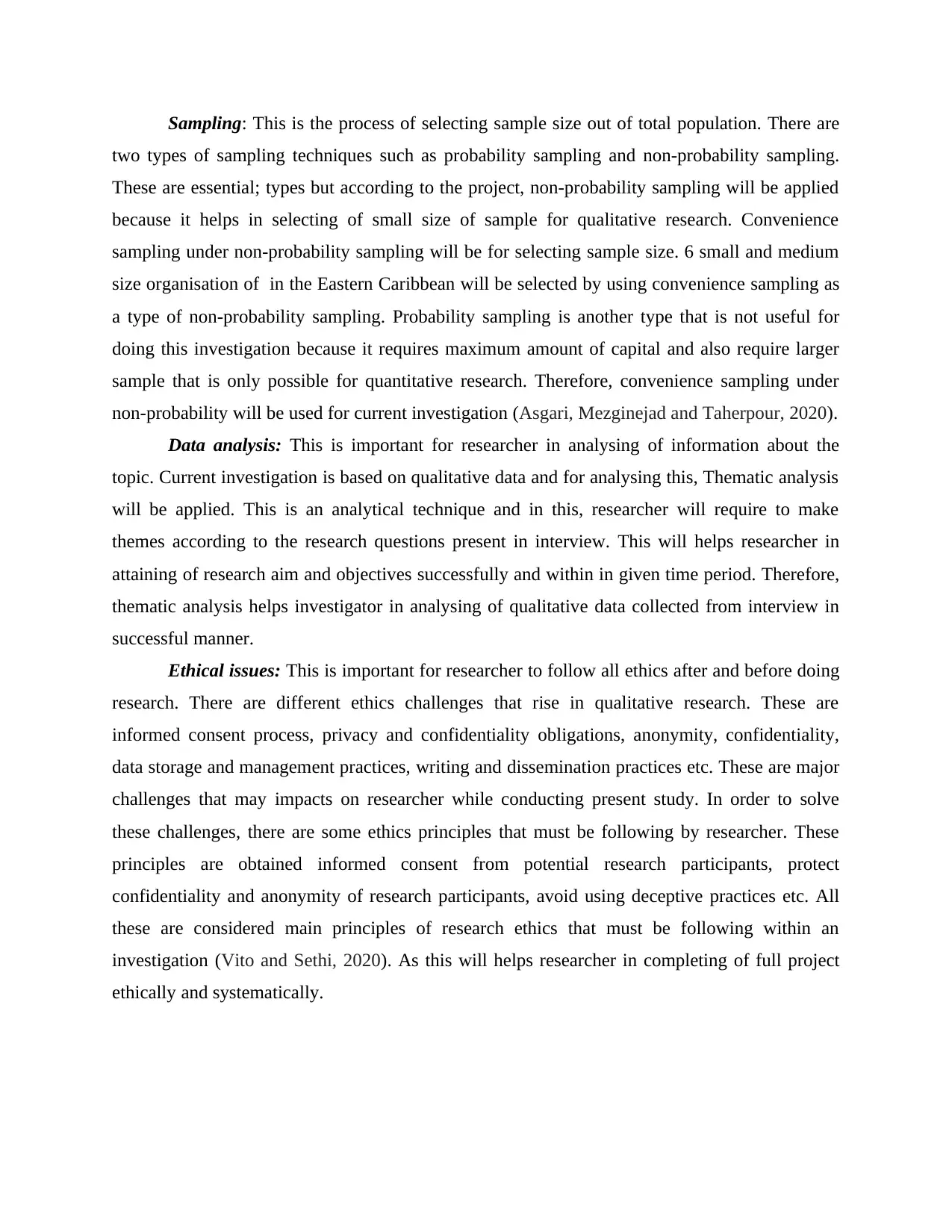
Sampling: This is the process of selecting sample size out of total population. There are
two types of sampling techniques such as probability sampling and non-probability sampling.
These are essential; types but according to the project, non-probability sampling will be applied
because it helps in selecting of small size of sample for qualitative research. Convenience
sampling under non-probability sampling will be for selecting sample size. 6 small and medium
size organisation of in the Eastern Caribbean will be selected by using convenience sampling as
a type of non-probability sampling. Probability sampling is another type that is not useful for
doing this investigation because it requires maximum amount of capital and also require larger
sample that is only possible for quantitative research. Therefore, convenience sampling under
non-probability will be used for current investigation (Asgari, Mezginejad and Taherpour, 2020).
Data analysis: This is important for researcher in analysing of information about the
topic. Current investigation is based on qualitative data and for analysing this, Thematic analysis
will be applied. This is an analytical technique and in this, researcher will require to make
themes according to the research questions present in interview. This will helps researcher in
attaining of research aim and objectives successfully and within in given time period. Therefore,
thematic analysis helps investigator in analysing of qualitative data collected from interview in
successful manner.
Ethical issues: This is important for researcher to follow all ethics after and before doing
research. There are different ethics challenges that rise in qualitative research. These are
informed consent process, privacy and confidentiality obligations, anonymity, confidentiality,
data storage and management practices, writing and dissemination practices etc. These are major
challenges that may impacts on researcher while conducting present study. In order to solve
these challenges, there are some ethics principles that must be following by researcher. These
principles are obtained informed consent from potential research participants, protect
confidentiality and anonymity of research participants, avoid using deceptive practices etc. All
these are considered main principles of research ethics that must be following within an
investigation (Vito and Sethi, 2020). As this will helps researcher in completing of full project
ethically and systematically.
two types of sampling techniques such as probability sampling and non-probability sampling.
These are essential; types but according to the project, non-probability sampling will be applied
because it helps in selecting of small size of sample for qualitative research. Convenience
sampling under non-probability sampling will be for selecting sample size. 6 small and medium
size organisation of in the Eastern Caribbean will be selected by using convenience sampling as
a type of non-probability sampling. Probability sampling is another type that is not useful for
doing this investigation because it requires maximum amount of capital and also require larger
sample that is only possible for quantitative research. Therefore, convenience sampling under
non-probability will be used for current investigation (Asgari, Mezginejad and Taherpour, 2020).
Data analysis: This is important for researcher in analysing of information about the
topic. Current investigation is based on qualitative data and for analysing this, Thematic analysis
will be applied. This is an analytical technique and in this, researcher will require to make
themes according to the research questions present in interview. This will helps researcher in
attaining of research aim and objectives successfully and within in given time period. Therefore,
thematic analysis helps investigator in analysing of qualitative data collected from interview in
successful manner.
Ethical issues: This is important for researcher to follow all ethics after and before doing
research. There are different ethics challenges that rise in qualitative research. These are
informed consent process, privacy and confidentiality obligations, anonymity, confidentiality,
data storage and management practices, writing and dissemination practices etc. These are major
challenges that may impacts on researcher while conducting present study. In order to solve
these challenges, there are some ethics principles that must be following by researcher. These
principles are obtained informed consent from potential research participants, protect
confidentiality and anonymity of research participants, avoid using deceptive practices etc. All
these are considered main principles of research ethics that must be following within an
investigation (Vito and Sethi, 2020). As this will helps researcher in completing of full project
ethically and systematically.
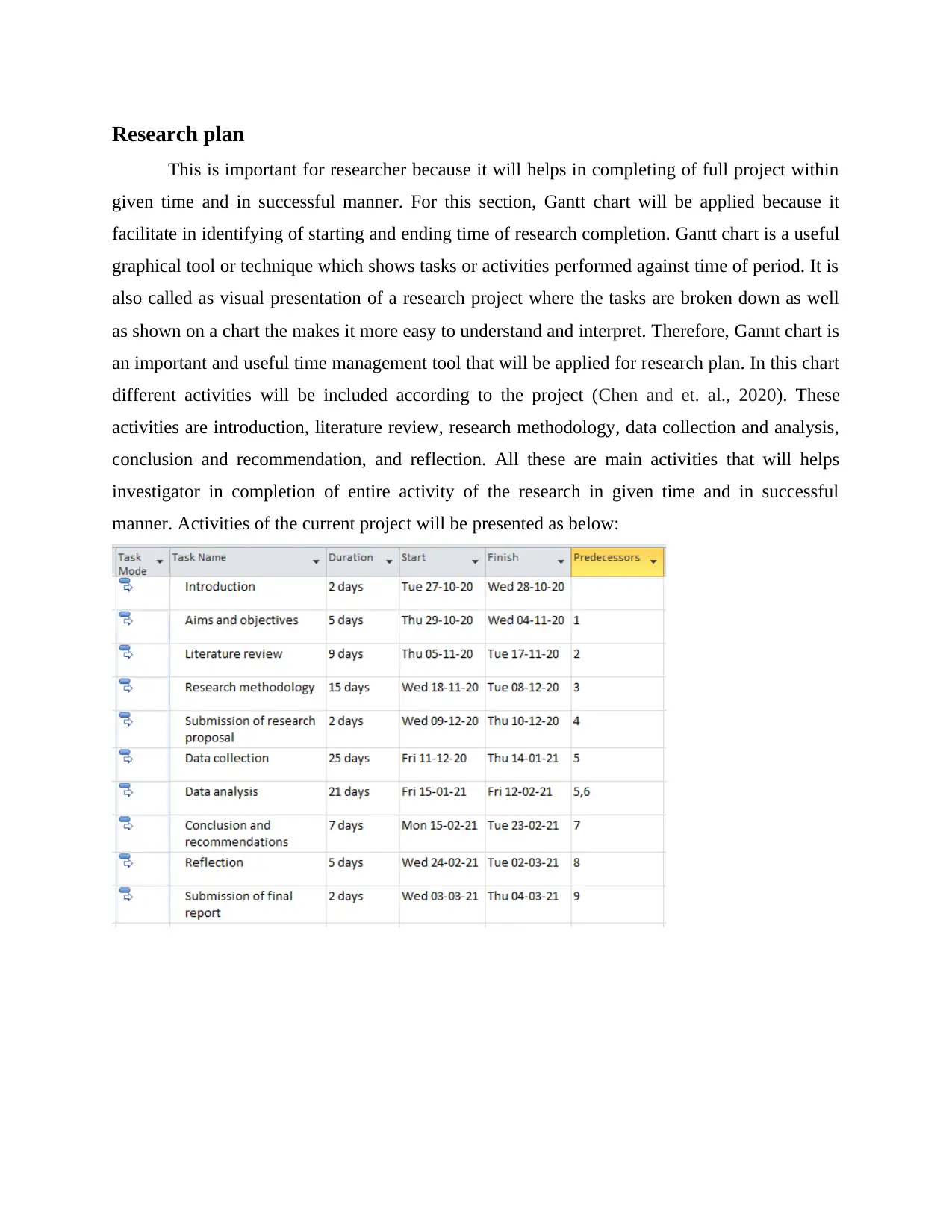
Research plan
This is important for researcher because it will helps in completing of full project within
given time and in successful manner. For this section, Gantt chart will be applied because it
facilitate in identifying of starting and ending time of research completion. Gantt chart is a useful
graphical tool or technique which shows tasks or activities performed against time of period. It is
also called as visual presentation of a research project where the tasks are broken down as well
as shown on a chart the makes it more easy to understand and interpret. Therefore, Gannt chart is
an important and useful time management tool that will be applied for research plan. In this chart
different activities will be included according to the project (Chen and et. al., 2020). These
activities are introduction, literature review, research methodology, data collection and analysis,
conclusion and recommendation, and reflection. All these are main activities that will helps
investigator in completion of entire activity of the research in given time and in successful
manner. Activities of the current project will be presented as below:
This is important for researcher because it will helps in completing of full project within
given time and in successful manner. For this section, Gantt chart will be applied because it
facilitate in identifying of starting and ending time of research completion. Gantt chart is a useful
graphical tool or technique which shows tasks or activities performed against time of period. It is
also called as visual presentation of a research project where the tasks are broken down as well
as shown on a chart the makes it more easy to understand and interpret. Therefore, Gannt chart is
an important and useful time management tool that will be applied for research plan. In this chart
different activities will be included according to the project (Chen and et. al., 2020). These
activities are introduction, literature review, research methodology, data collection and analysis,
conclusion and recommendation, and reflection. All these are main activities that will helps
investigator in completion of entire activity of the research in given time and in successful
manner. Activities of the current project will be presented as below:
⊘ This is a preview!⊘
Do you want full access?
Subscribe today to unlock all pages.

Trusted by 1+ million students worldwide
1 out of 16
Related Documents
Your All-in-One AI-Powered Toolkit for Academic Success.
+13062052269
info@desklib.com
Available 24*7 on WhatsApp / Email
![[object Object]](/_next/static/media/star-bottom.7253800d.svg)
Unlock your academic potential
Copyright © 2020–2026 A2Z Services. All Rights Reserved. Developed and managed by ZUCOL.





